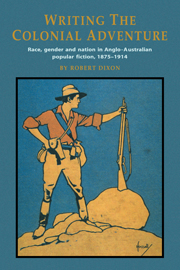 Writing the Colonial Adventure
Writing the Colonial Adventure Book contents
- Frontmatter
- Contents
- List of Illustrations
- Acknowledgements
- Introduction
- 1 The Romance of Property: Rolf Boldrewood and Walter Scott
- 2 Outlaws and Lawmakers: Boldrewood, Praed and the ethics of adventure
- 3 Israel in Egypt: The significance of Australian captivity narratives
- 4 Imperial Romance: King Solomon's Mines and Australian romance
- 5 The New Woman and the Coming Man: Gender and genre in the ‘lost-race’ romance
- 6 The Other World: Rosa Praed's occult fiction
- 7 The Boundaries of Civility: Australia, Asia and the Pacific
- 8 Imagined Invasions: The Lone Hand and narratives of Asiatic invasion
- 9 The Colonial City: Crime fiction and empire
- 10 Beyond Adventure: Louis Becke
- Conclusion
- Notes
- Select Bibliography
- Index
5 - The New Woman and the Coming Man: Gender and genre in the ‘lost-race’ romance
Published online by Cambridge University Press: 05 November 2011
- Frontmatter
- Contents
- List of Illustrations
- Acknowledgements
- Introduction
- 1 The Romance of Property: Rolf Boldrewood and Walter Scott
- 2 Outlaws and Lawmakers: Boldrewood, Praed and the ethics of adventure
- 3 Israel in Egypt: The significance of Australian captivity narratives
- 4 Imperial Romance: King Solomon's Mines and Australian romance
- 5 The New Woman and the Coming Man: Gender and genre in the ‘lost-race’ romance
- 6 The Other World: Rosa Praed's occult fiction
- 7 The Boundaries of Civility: Australia, Asia and the Pacific
- 8 Imagined Invasions: The Lone Hand and narratives of Asiatic invasion
- 9 The Colonial City: Crime fiction and empire
- 10 Beyond Adventure: Louis Becke
- Conclusion
- Notes
- Select Bibliography
- Index
Summary
Indeed, abolition of everything is the advanced womans raison d'ê;etre, but there is nothing she yearns for the abolition of more than that of her natural rival – man.
Bulletin, 23 June 1888In her essay ‘The Politics of Respectability’, Marilyn Lake argues that in the 1880s and 1890s the Sydney Bulletin and other organs of ‘the men's press’ actively promoted ‘a separatist model of masculinity’, praising mateship and male freedom, and warning of the dangers of feminine culture, including the emasculating effects of home and family life. Although Lake has been criticised for promoting another historicist ‘Legend of the Nineties’, her work remains valuable as a description of ‘the contest between men and women at the end of the nineteenth century for control of the national culture’. In this chapter I want to take up the argument advanced by Fiona Giles and Susan Sheridan, among others, that the genre of romance fiction was an important site of that contest for historical agency.
My particular interest is in the lost-race romance, whose narrative conventions focus on changing definitions of gender and power by bringing into conflict those two characters in my title, the New Woman and the Coming Man. Although the lost-race romance was essentially a masculine and metropolitan form, it also attracted authors from widely differing locations in the broader imperial culture, including a number of Australian men and, surprisingly perhaps, at least one Australian woman author.
- Type
- Chapter
- Information
- Writing the Colonial AdventureRace, Gender and Nation in Anglo-Australian Popular Fiction, 1875–1914, pp. 82 - 99Publisher: Cambridge University PressPrint publication year: 1995
